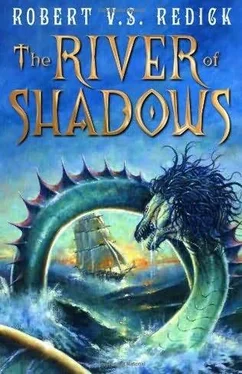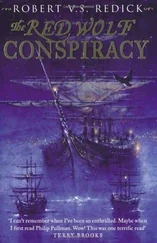Robert Redick - The River of Shadows
Здесь есть возможность читать онлайн «Robert Redick - The River of Shadows» весь текст электронной книги совершенно бесплатно (целиком полную версию без сокращений). В некоторых случаях можно слушать аудио, скачать через торрент в формате fb2 и присутствует краткое содержание. Жанр: Фэнтези, на английском языке. Описание произведения, (предисловие) а так же отзывы посетителей доступны на портале библиотеки ЛибКат.
- Название:The River of Shadows
- Автор:
- Жанр:
- Год:неизвестен
- ISBN:нет данных
- Рейтинг книги:4 / 5. Голосов: 1
-
Избранное:Добавить в избранное
- Отзывы:
-
Ваша оценка:
- 80
- 1
- 2
- 3
- 4
- 5
The River of Shadows: краткое содержание, описание и аннотация
Предлагаем к чтению аннотацию, описание, краткое содержание или предисловие (зависит от того, что написал сам автор книги «The River of Shadows»). Если вы не нашли необходимую информацию о книге — напишите в комментариях, мы постараемся отыскать её.
The River of Shadows — читать онлайн бесплатно полную книгу (весь текст) целиком
Ниже представлен текст книги, разбитый по страницам. Система сохранения места последней прочитанной страницы, позволяет с удобством читать онлайн бесплатно книгу «The River of Shadows», без необходимости каждый раз заново искать на чём Вы остановились. Поставьте закладку, и сможете в любой момент перейти на страницу, на которой закончили чтение.
Интервал:
Закладка:
Another voice began to sing. This time it was a soldier on the Chathrand’s quarterdeck. His song was slower, deeper, but still eerie, like a voice that comes echoing from somewhere very far away. Not unpleasant, thought Ott, and yet it produced only terror on the Great Ship. Most of the dlomu ran, leaping from the quarterdeck, dropping lanterns, shoving and jostling. The singer’s nearest comrade shook him by the arms, then slapped him. The man paused briefly, then raised his arms to the sky and resumed the song. His comrade darted into the wheelhouse and returned with a rigging-axe. He clubbed his friend down with the flat of the axe-head. Only then did the singing cease.
“Now do you understand, at last?” cried Ibjen. “Now do you see why madness is not something we joke about?”
Dlomic officers were screaming: “Hold your ground! Stay at your posts!” A few soldiers obeyed, but the bulk simply fled, over the gangways, down the scaffolding, away from the fallen man and the scene on the derelict. All around the port, lamps were appearing, swinging wildly as their bearers ran here and there. Cries of panic echoed through the streets.
“Gentlemen,” said Olik, “the Nilstone is gone.”
“What?” shouted Hercol. “How do you know this? Tell me quickly, Sire, I beg you!”
“I was aboard the Chathrand not thirty minutes ago,” said the prince. “Vadu caught me, demanded to know what I had done with the Stone, made oblique references to my death. He drew the tiny shard of the Plazic Blade he carries and showed it to me. ‘This,’ he said, ‘is eguar bone. I could use it to dry the blood in your veins, or to stop your heart-without touching you, without breaking the law.’ Then he told me that the Issar had just received a message from Bali Adro City, by courier osprey. Absolutely no one was to meddle with ‘the little sphere of darkness’ in the statue’s hand, until further notice. On pain of death. Vadu said he had rushed to the ship to redouble the guard, but had found his men slain in the doorway to the manger, and the door unlocked, and the statue empty-handed, with two broken fingers lying in the hay.
“Then Vadu raised his blade, and I felt a sudden cold grip my heart. I had a last, desperate card to play, and I did so. ‘The Imperial family is defended by more than laws, Counselor,’ I said. ‘Ours is a destiny as old and certain as the stars. No one who draws my blood shall escape the wrath of the Unseen.’ I could see that he was not wholly convinced. ‘The Nilstone has vanished,’ he said, ‘and you alone are here at the moment of its vanishing. You would do better to confess what you know than to threaten me with superstitions.’ I assured him that the Stone was a deadly weapon-deadlier by far than his Plazic Blade-and that only Arunis could have stolen it. Vadu replied that he had the Great Ship surrounded, and that no one had been in or out of the ship save his guards-and me.”
The shouting now was like the mayhem of a town besieged by pirates. Children and parents all screaming, dogs howling, maddened; everyone running away. The exodus from the Chathrand was almost complete: only a score of guards remained on the topdeck.
“What were you doing aboard?” demanded Ott.
“Looking for gold,” said the prince, “to bribe the Issar on your behalf. I do not know what he intends to do with you, gentlemen, but despite the repairs to your vessel I doubt strongly that he means to let you go on your way. Ibjen and I have spoken often of your plight since we jumped ship. You made a deep impression on the boy, Mr. Stanapeth-you, and Fiffengurt, and your three younger allies. Ibjen has the idea that there are riches aboard, and Mr. Bolutu, whom I visited this morning (he remains locked up with your shipmates, incidentally), confirmed it, though he has no idea where they might be hidden. It occurred to me that they might be in the stateroom, for where else could they be safer than behind the wall? But I found nothing: only your rat-friend, Felthrup. He is in a curious state of mind himself.”
“You took a grave risk for us,” said Hercol, but his voice was still uncertain.
“And nearly died for it,” said Ibjen. “Counselor Vadu is a traitor! He has raised his hand against the royal family!”
“Strange, isn’t it?” said Ott. “A man in his position will have thought hard about that law, and especially the words on pain of death. All the same he decided it was time to kill you. Though he feared to wield the knife himself.”
“And so hired assassins,” said Olik, nodding, “and presumably meant to have them killed in turn. But it was still an astonishing move. I wonder what else was in that message? Does the Emperor himself wish me killed? And if death is to be my fate, what can they mean to do with you?”
“I know what Bali Adro means to do with us,” said Hercol. “I have learned it this very night.”
“You have?” snapped Sandor Ott. “From whom? When were you going to tell us, damn your eyes?”
“As soon as we found a moment’s safety,” said Hercol. “But I will not tell you, prince. I am glad we saved you, but I cannot give you my trust: not after your words in the doorway of the stateroom.”
“Hercol Stanapeth,” said the prince, “that is exactly why I spoke them. I dared not leave you thinking well of me. Arunis was spying on your thoughts-crudely, but persistently. If trust and warmth had been uppermost in your minds, he would have known at once that I was his enemy, and turned Vadu against me that much sooner. But he has fled now. He has betrayed Vadu and the Issar, and stolen the Nilstone, and disappeared. And now I may stand before you and speak the simple truth. I am one of your number, swordsman: a foe of Arunis and the Raven Society, and a friend of Ramachni. I would be your friend also.”
“Well that’s blary scrumptious,” said Alyash, “but what are we to do about the Nilstone?”
Hercol turned to Olik. “You say that Vadu told you he’d searched the ship?”
“Deck by deck,” said the prince. “There was no sign of Arunis. Vadu was convinced the mage had taken refuge behind the magic wall. I tried to explain the impossibility of that, but I am not sure he believed me.”
Hercol looked from the prince to Ott, and back again. “I may yet regret this choice,” he said, “but I think you are exactly what you claim. Prince Olik Bali Adro, here is what I know: Arunis has made magical contact with a sorceress almost as powerful as himself. Someone close to your Emperor by the name of Macadra.”
“Macadra!” The prince started forward in terror. “The White Raven! Are you sure?”
“Let me finish,” said Hercol. “She has dispatched a ship for Masalym; it is to arrive any day. And when it does the crew of that ship is to take possession of the Chathrand, and sail with it, and the Nilstone, back to where she waits in your capital.”
“Flames of the Pit!” shouted Ott, enraged. “How long have you known this, Stanapeth?”
“Not two hours,” said Hercol. “But there is yet a little more. Rivalry may well exist between Arunis and Macadra, but they both intend to see the Nilstone used to dominate or destroy the lands we come from. Not Arqual alone, Master Ott. I mean all lands north of the Ruling Sea. And Arunis, perhaps, does not mean for it to end even there.”
“By the eyes of heaven,” said the prince, “you do come at the time of the world’s ending! You have brought both the devil and his tool into our midst, and now our own devils are joining the game.”
He checked himself with a sigh. “No, that is not fair. Arunis is our devil as much as anyone’s, and the Nilstone has plagued both sides of the Ruling Sea, and the Chathrand was built in Bali Adro herself. How small the world becomes, when we contemplate its doom.”
Читать дальшеИнтервал:
Закладка:
Похожие книги на «The River of Shadows»
Представляем Вашему вниманию похожие книги на «The River of Shadows» списком для выбора. Мы отобрали схожую по названию и смыслу литературу в надежде предоставить читателям больше вариантов отыскать новые, интересные, ещё непрочитанные произведения.
Обсуждение, отзывы о книге «The River of Shadows» и просто собственные мнения читателей. Оставьте ваши комментарии, напишите, что Вы думаете о произведении, его смысле или главных героях. Укажите что конкретно понравилось, а что нет, и почему Вы так считаете.












